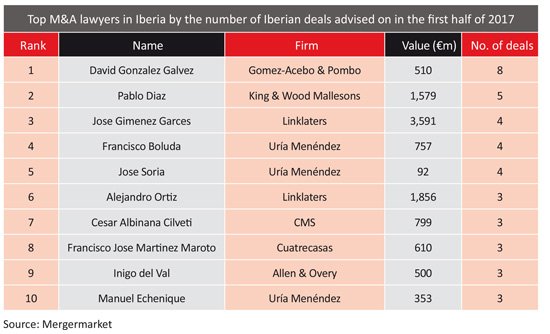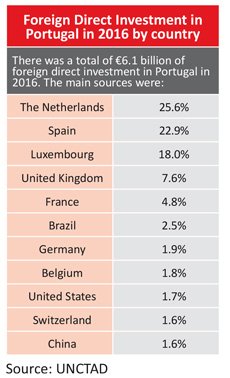Volume of Spanish M&A increasing, though growth at risk due to Catalonia situation
Deal flow was increasing in the real estate, technology, transport and energy sectors, with private equity deals up 161% year-on-year
The year 2017 has so far proved an exceptional one for Spanish M&A, which has increased significantly in terms of both the volume and value of deals in recent months, lawyers say. In terms of total deal value, data from Mergermarket shows that by the middle of June this year, the total value of Spanish M&A deals had almost equaled the total for the whole of 2016 – there had been 135 deals worth a total of €46.7 billion, slightly less than the €48 billion of deals announced by year end 2016. However, the crisis in Catalonia has given rise to fears that deal flow will slow.
“The market has grown in terms of volume and value, and we´re seeing a larger number of international investors interested in Spain – 2017 has brought record levels in terms of cross-border deals, both inbound and outbound,” remarks Uría Menéndez partner Juan Martín Perrotto.
Growth is taking place across the spectrum, with deal flow increasing in the real estate, technology, industrial, transport, entertainment and energy sectors, in particular. “Even the renewables market is again attracting interest from investors who have adjusted their expectations and no longer anticipate double-digit yields,” says CMS Albiñana & Suárez de Lezo partner Luis Miguel de Dios (pictured left). The healthcare and pharmaceutical industries also have enormous potential, as public and private spending increases in response to an ageing population. “There is a wealth of innovative projects in the biotech industry which will bring medical advances and investment opportunities – it’s a high-return, but also a high-risk, sector,” remarks partner Enrique Carretero of Baker McKenzie.
Tougher regulation
There is anticipation that there will be continued growth in the finance sector, which has, in recent years, been a major generator of M&A activity in Spain, representing 25 per cent of the market in the five years before the recession. “We will see large divestments as tougher regulation and capital requirements force banks to abandon activities outside of their core business,” Carretero says. Although technological changes are often perceived as a threat to the financial services industry, Carretero argues that they are also a driver for M&A deals: “Small, internet or app-focused banks are becoming attractive targets for larger entities, and we will see an increase in related transactions.”
Start-up companies in the technology sector – a key area of growth in the Spanish market – are also expected to generate significant levels of M&A activity as buyers across all industries base their strategies on innovation and digitalisation. “Data protection, cybersecurity, data analytics and innovation in payment methods will drive increases in M&A activity in the tech sector,” adds Carretero.
One strategy private equity investors adopted in order to cope with the financial crisis was changing the profile of the products they targeted, but they have now recovered their appetite for more traditional assets. “Private equity funds never left completely, not even during the crash – they simply changed their targets and now they´ve returned to more traditional products,” says De Dios. Private equity funds are currently investing in a wide range of industries that they consider to have significant growth potential, including food and drink, retail, tourism, energy, leisure and pharmaceuticals. “In principle, private equity funds do not seek to invest in a particular sector, except those which are specialised,” Carretero says. “Large funds are omnivorous – what they seek in a target is potential for growth, either on its own or in combination with other businesses.” Mergermarket data shows that by mid-June this year, there had been a surge in private equity activity with “buyouts and exits” up 161.7 per cent by value on the previous year.
 Paying higher fees
Paying higher fees
Private equity clients have an in-depth knowledge of the market and are consequently able to target the highest-return investments and this has an impact on fees, according to Carretero. “Private equity funds generally pay higher fees than industrial investors, as they pursue high-growth strategies which yield larger returns and in turn, allow for a more substantial initial investment,” he says. Private equity investors are also acutely aware of the risks involved in each purchase, and they appreciate the value of ‘watertight’ advice. This also has an impact on fees, says De Dios: “Private equity funds are professional investors with extensive know-how, which also means they know what’s at stake – as a result, they understand the value of high-quality advice.”
The outlook for the coming months is positive, despite global political turbulence. “Uncertainty has already been factored into purchase prices, and investors are becoming accustomed to operating in this climate – they need to invest, and the market will continue to grow,” believes Martín Perrotto (pictured left). Carretero points to Spain´s geographical and demographic characteristics, as well as its role as an access point for other markets, as factors which will continue to boost the M&A market: “Spain is a stable economy with 47 million consumers and 60 million visitors per year, with a privileged geo-strategic position. Spanish corporates have a strong presence overseas, which gives buyers access to international markets not only in Europe, Latin America and the US, but also Asia and Africa.”
However, the extent to which any gains will be offset by investor nervousness fuelled by the political situation in Catalonia remains to be seen.












